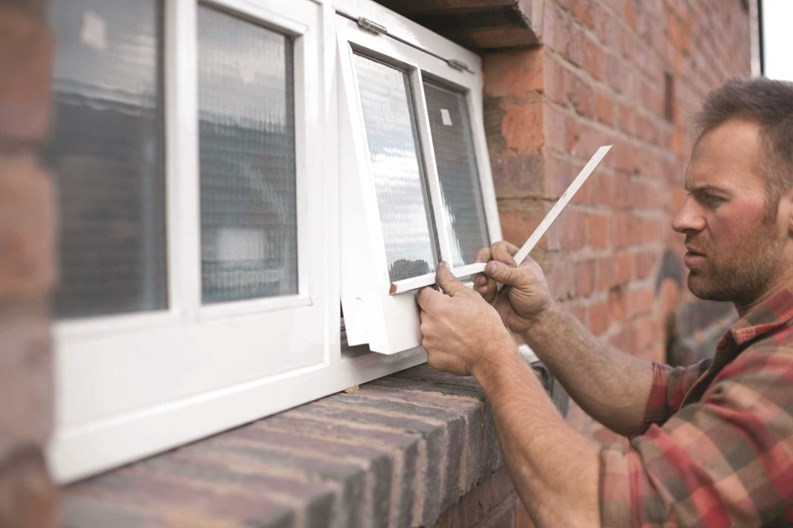The earliest windows were literally holes in walls—maybe covered by animal skins, if the owner was ambitious, or the weather was chilly—and were useful only for allowing a little air and light into the living space.
Eventually, mankind found ways to make windows both more useful and more beautiful. The ancient Egyptians had shutters and cotton drapes, and the Romans actually used glass in their windows. Mullioned panes and stained glass designs came along centuries later to enhance windows and to show status and wealth. During the 18th and 19th century in Europe, a property tax based on the number of windows per dwelling, was a hotly protested issue. Property owners from that period sometimes closed in the window spaces in protest of the government “stealing daylight" by taxing it.
For most of the last hundred years, the biggest issues with windows has been planning for cross-ventilation in the days before air conditioning was common, and making sure the windows were closed before it rained in. Over the last few decades however, the door and window industry in America has evolved as a separate niche in the construction industry. Windows are generally considered a necessity and an amenity. They convey style, provide protection from the elements, enhance ambiance and conserve energy—and like any other building element, they require routine maintenance and replacement. The right combination of elements can mean the difference between filling a hole in the side of the building or installing an energy efficient architectural element that continues to add value and beauty to the property for years to come.
A Big Project
Replacing or repairing windows in a multi-storied, multi-unit condominium or co-op is a major undertaking for everyone involved. The board, the residents, the property management firm and the company selected to perform the work will need a coherent plan and excellent communication skills to keep the project on track and to minimize the disruptions for staff and residents.
According to the experts, windows generally have a 20- to 30-year life span depending on the window material and finish, and the elements they're exposed to. However, if windows were poorly or incorrectly installed, or if proper maintenance such as caulking and painting has been inadequate, replacement will be needed sooner rather than later. If maintenance has been thorough and diligent, the life of the windows may well be extended.
Another factor affecting window replacement is the current rate of improvements in energy efficiency technology. Windows manufactured today are significantly improved over windows of just a few years ago. Energy efficiency issues may have a property considering replacement of windows and door much sooner than originally anticipated.
A board may choose to work with the maintenance team initially to determine if and when replacing windows should move from the discussion phrase to the action phrase. Inspecting windows in common areas and in board member units, along with any specific resident complaints will quickly reveal any major issues pertaining to the deterioration of windows.
Beware of Water
Michael Kornegay is a general manager for the commercial division of Pella Windows in West Caldwell, New Jersey. Kornegay labels water as the most destructive element in window deterioration. “Water infiltration, poor installation, and lack of proper maintenance, along with an incorrect product for the building will result in window deterioration,” he states.
Water damage is pretty easily identified by stains on wood or sheetrock and plaster. Mold, mildew, rotting wood and pitted aluminum frames are also a dead giveaway that window replacement is required. Kornegay notes diminished operating performance and cloudy glass from seal failure as additional proof that repair and replacement is imminent. He has seen wooden casement windows in operation for over thirty years, but believes that the typical life span is closer to twenty years. “Well-maintained aluminum-clad models may last over thirty years, but again this is dependent on the level of maintenance. Once repair is no longer an option, it is time to consider a full window replacement,” he said.
Michael Lentin is owner and president of CitiQuiet Windows in Long Island City and he acquired Syosset-based Champion Window and Door in 2010. With twenty-two years in the window industry, Lentin founded CitiQuiet in 1992, developing a custom soundproof window that fits inside an existing window to eliminate unwanted city noise.
In addition to water and moisture damage, Lentin also cites pollution from traffic, soot and construction as some of the most damaging elements for windows. He agrees with Kornegay that repair and maintenance make a difference but the life expectancy for most windows is in the 20-year range. Wood and aluminum-clad windows are common, but vinyl and plastic windows are often prohibited by fire codes, and those products are not available for historic or landmark buildings. Steel, typically used in pre-World War II buildings is now uncommon.
The Replacement Process
When an association has made the decision to replace windows, there are numerous steps involved to outline the project and establish a timeline for completion. Deciding on a contractor and scheduling an initial site inspection is usually the first step. Once a building contracts a window and door contractor for replacement options, an iniftial site inspection, field measuring and installation estimate will provide the information and specifics necessary for the board to decide on the best course of action.
How long the project will take depends on many factors. Lentin works with a time per window formula and states a typical 700 window replacement job will take roughly four months from initial proposal and five to six weeks of installation. Kornegay allows six to eight weeks for a typical job. Both agree landmark and historic buildings generally require several additional weeks, mostly in the preparation stage.
“The primary difference in landmark replacement is that new replacement windows must match what was originally used in the building,” says Kornegay. “Replacement on landmark buildings is limited primarily to wood and wood clad products. Fiberglass and vinyl windows cannot be used in historic or landmark buildings.”
Dave Hewitt is vice president of sales and marketing for EFCO Corporation, a Pella company, and he offers a unique approach to a window replacement project timeline. “Start with the end in mind,” he advises. “Work backwards from when you want to be finished, and you can best determine the critical path.” EFCO handles large multi-storied buildings, with thousands of windows magnifying the challenges by sheer volume. “If there is a need for concrete restorations, or waterproofing in order to install the new windows it should be noted during the initial assessments,” he advises.
Once the windows are ordered and delivered several factors determine how smoothly and quickly the installation is accomplished. Windows are generally installed from the interior. Installation from the exterior on lower floors is somewhat less invasive; however it can be more costly due to scaffolding,” says Kornegay. “For replacement on higher floors, scaffolding is not an option.” At any rate, windows will need to be tested, and inspected for operational evaluation, so interior access to individual units is a must for completion of the project.
Lentin mentions working closely with the association board to determine the amount of tolerance for workmen in the building, elevator usage, hours per day, and days per week. Hewitt stresses the importance of addressing security issues. “Some boards may prefer that a dedicated security member be available to check the contracting team in and out of the building,” he says.
The most efficient way to replace windows may well be dubbed “one and done”—one window out- one window in. This approach will cut down on noise, dust and drafts. Containment systems such as “zip walls” will also minimize those issues. Window replacement can be accomplished all year long, with the possible exception of high winds. Kornegay also cites rainy conditions and extreme temperatures beyond manufacturers’ recommended conditions for sealant, as areas of concern.
As the old windows are removed it will be important to allow for protecting the sidewalks and building exterior, and keeping the area clean and free of debris.
Better Tech, Better Windows
The products and technologies currently available for windows and doors have seen rapid advancements over the last decade. The last five years alone have seen major innovations in energy efficiency and “green energy” materials for windows and doors. Energy-efficient double-glazed windows and new double-glazed composite windows are just two of the improvements in efficiency. The recyclability and the environmental impact of materials used in manufacturing these new products is also an important improvement. According to John Zoetjes, president of American Architectural Window & Door, a window and door replacement company for residential and commercial properties based in Sparta, New Jersey, “The window industry has come a long way in the last decade, offering more energy-efficient products, and technological improvements, like non-corrosive hardware and paint finishes for coastal environments and specialty glazing to reduce noise pollution.”
According to Frank Manzella, president of Thermo-Roll Window Corp., a commercial window manufacturer in West Babylon, Long Island, some of the most popular types of windows being installed these days are “tilt-and-turn windows, especially in the new buildings. They can tilt inward like a van door for cleaning, and tilt outward at the top for ventilation.“ The hardware is made in Europe, he says, and Thermo-Roll holds a U.S. patent.
As the tilt-and-turn models are requested more and more, Manzella says that consumers are getting away from the more old-fashioned double-hung windows. “The double hung has a bar that goes across the pane,” says Manzella, “and has been the most popular design since the days of Abraham Lincoln. The tilt-and-turn window looks more like a picture window, and operates so it’s like three windows in one.”
“There’s also Low-E, which has been around for years,” Manzella continues. In colder months, Low-E glass bounces the room’s radiant heat back into the room again and gives you the equivalent of triple glazing. It does the reverse in the summertime—it bounces the sun’s UV rays out. Both functions help to reduce HVAC costs.
“They also have fire-protection glass,” Manzella continues. “It’s fire rated to withstand intense heat for 20 to 120 minutes. That’s one of the latest advances. Very few people know that window strength is largely determined by the strength of the glass. That helps determine the ratings of different windows. And as far as sound protection, the best thing to do is have unequal panes of glass. That unequal surface deadens the sound.”
Whatever type of glass or style of window best suits your particular building, the ticket to a relatively painless, hassle-free replacement project is, as the pros say, careful planning, clear communication, and a competent contractor who will work with your building administrators and community to make the process a 'clear' success.
Anne Childers is a freelance writer and a frequent contributor to The Cooperator. Associate Editor Hannah Fons contributed to this article.







Leave a Comment